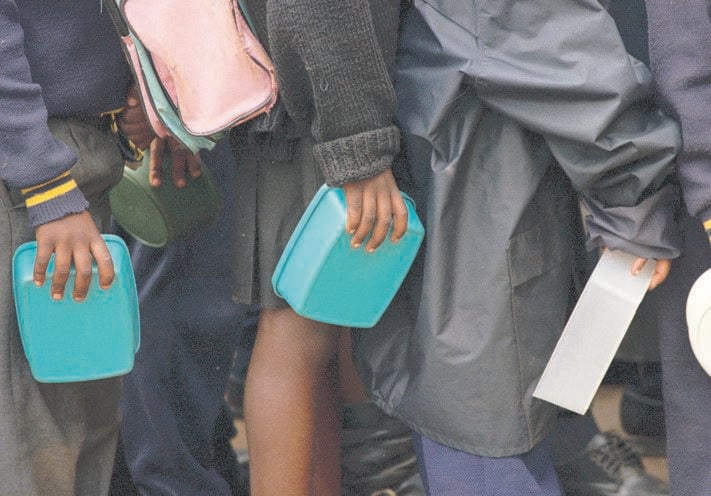
Although families are scared of Covid-19 and are staying inside at home, they want schools to open so that the children will get something to eat
The Gubevu family is feeling the effects of the Covid-19 coronavirus lockdown as it struggles to feed its children who would normally benefit from a school nutrition programme – if schools were open.
Phumzile Gubevu (61), a married father of three who lives in Gxulu village near Mthatha, said since the schools had closed in the second week of March they had been feeling the pinch as parents, having to provide more food for their family, with three children who were no longer eating at school.
He said the single meal the children had at school daily made a huge difference to his family. All his children were at school and benefited from the school nutrition programme.
Gubevu, a pensioner who survives on the government’s R1 860 old-age grant, said the meal his children received at school relieved some pressure as they did not have enough resources to provide enough food for their children.
Sometimes, when the children returned from school, they went straight to bed and took a nap or did their homework.
By the time they were finished with their homework, it would already be time for supper.
Gubevu’s wife, Nolothando (40), is unemployed.
Their other source of income is from each of their two younger children’s R440 child-support grants.
Andisiwe (9) is in Grade 5; Luyolo (14) is in Grade 6; and their eldest daughter Nosipho (19) is in Grade 12 and is not a beneficiary of the child-support grant.
She, however, also got food while at school through the education department’s school nutrition programme.
“Life is hard. You must remember that this coronavirus thing was a shock to all of us. Nobody could plan for it and, before we knew it, the country was at a complete standstill and under lockdown. For the family, it was very hard, especially because everything happened abruptly. At the time the lockdown started, we did not even have food in the cupboards because we had not been paid the social grants,” he said.
Gubevu said it was easier during school term as he and his wife would sit at home without eating much, only having a cup of tea every now and then. But now, since the children were at home all the time, they had to ensure there was food.
“We are sometimes forced to get food from the local shops on credit because we cannot allow our children to starve while we are waiting for social grants to be paid. But this presents problems because it means when the grants are paid we have to settle our debt first at the shops before we can buy anything.”
He said most of the money they got from the government social grants went on groceries, electricity and funeral plans.
They were left with a small amount of pocket money to buy things, such as bread and milk, which were needed almost daily.
The family spent about R1 200 on groceries alone and R400 on electricity every month.
“We are not coping, to be honest, but there is nothing we can do. We are also afraid of the virus and everyone in the family is staying at home as instructed by the government.
“But as a family we can’t wait for schools to be reopened so that the children can go back to school and life can get back to normal again.”
Gubevu said it was during the lockdown period that they had realised how important it was for the children to get food at school.
He joked that it was better when the kids were at school during the day because the fridge would at least get a break.
He said every 30 minutes he heard the fridge open and close, with his children checking to see if there was something they could eat or snack on.
“Sometimes you don’t know whether they are really hungry or just bored. My youngest child opens the fridge, takes whatever she wants and eats.
“Later, her eldest brother asks who ate his food that was in the fridge and a fight breaks out. This whole situation has resulted in the demand for more food in the house, which is difficult because no one is employed here,” he said.
Loyiso Pulumani, the spokesperson for the Eastern Cape education department, had not responded by the time of going to print.
Dreading to think about the calamity a prolonged Covid-19 coronavirus lockdown would bring on her family, Zanele Mbokodo (30) said: “Only God knows.”
Deep rural village families – like Mbokodo’s in Nkomazi near Malelane – who rely on school-feeding schemes and drop-in centres for their daily meals are feeling the harshness of the lockdown. The closure of schools and drop-in centres, which feed the poorest of the poor, means two meals are no longer available in a day.
Mbokodo’s family of seven – her three sisters, aged 33, 30 and 14, and three children, aged 12, 11 and four – had an income of only R1 720 in child-support grants for all the children.
Before the lockdown, they did not have to worry much about food for the four children as they ate at school and at a drop-in centre.
Thobile (33), the eldest sister, also sold avocados and mangoes in Johannesburg to supplement their meagre income, but because of the lockdown, she could no longer travel.
“It’s very bad, shem,” Mbokodo said.
“We must now cook and there is nothing much one can buy from the child-support grants.”
From the grants, the family buys a bag of mealiemeal and some items for sishebo, such as meat, soup and vegetables. The groceries did not last the month.
“My sister is now stuck here at home and cannot go to sell in Johannesburg as before. I just hope our government will look after us and make a plan about getting us food,” Mbokodo said.
Nkomazi is one of the poorest municipalities in Mpumalanga. Data from Wazimaps show only 30% of the 410 907 population (103 963 households) are employed and 1 329 of households are headed by children under 18.
The Mbokodo sisters always had a tough life. Their mother, who raised them as a single parent, died in 2011 and they had to take over raising their youngest sister. And then they had children of their own.
About 370km in the opposite direction of Nkomazi, in Daggakraal near Volksrust, government food parcels had been delivered at the drop-in centre that fed 275 children and 245 adults.
The destitute families got 12.5kg of mealiemeal, potatoes, soup and vegetables. Thokozile Yende, a volunteer worker at the drop-in centre, said the situation was tougher for the beneficiaries because the parcels were not enough. The children got breakfast before going to school and their lunch after school; adults also got two meals a day; those on chronic medication were given supper to take home.
“They will try to eat for those few days, but some of these people need to cook and cannot afford coal and firewood. I’m afraid people will die more from hunger than from Covid-19,” Yende said.
- Sizwe Sama Yende
TALK TO US
Lack of food is a huge problem for those in lockdown. Do you have enough money to buy food for your family?
SMS us on 35697 using the keyword FOOD and tell us what you think. Please include your name and province. SMSes cost R1.50. By participating, you agree to receive occasional marketing material
 |
| ||||||||||||
| |||||||||||||




 Publications
Publications
 Partners
Partners








